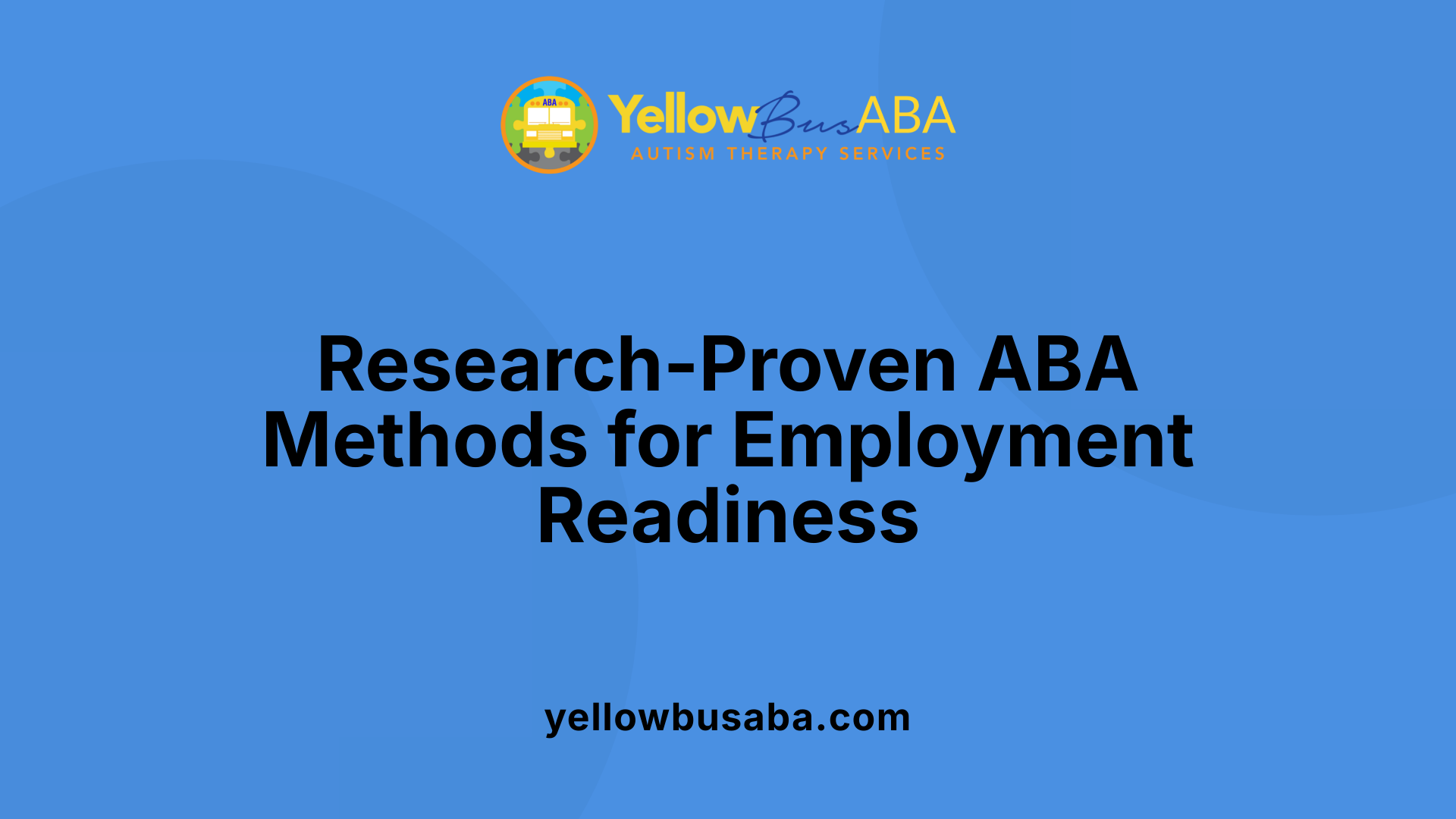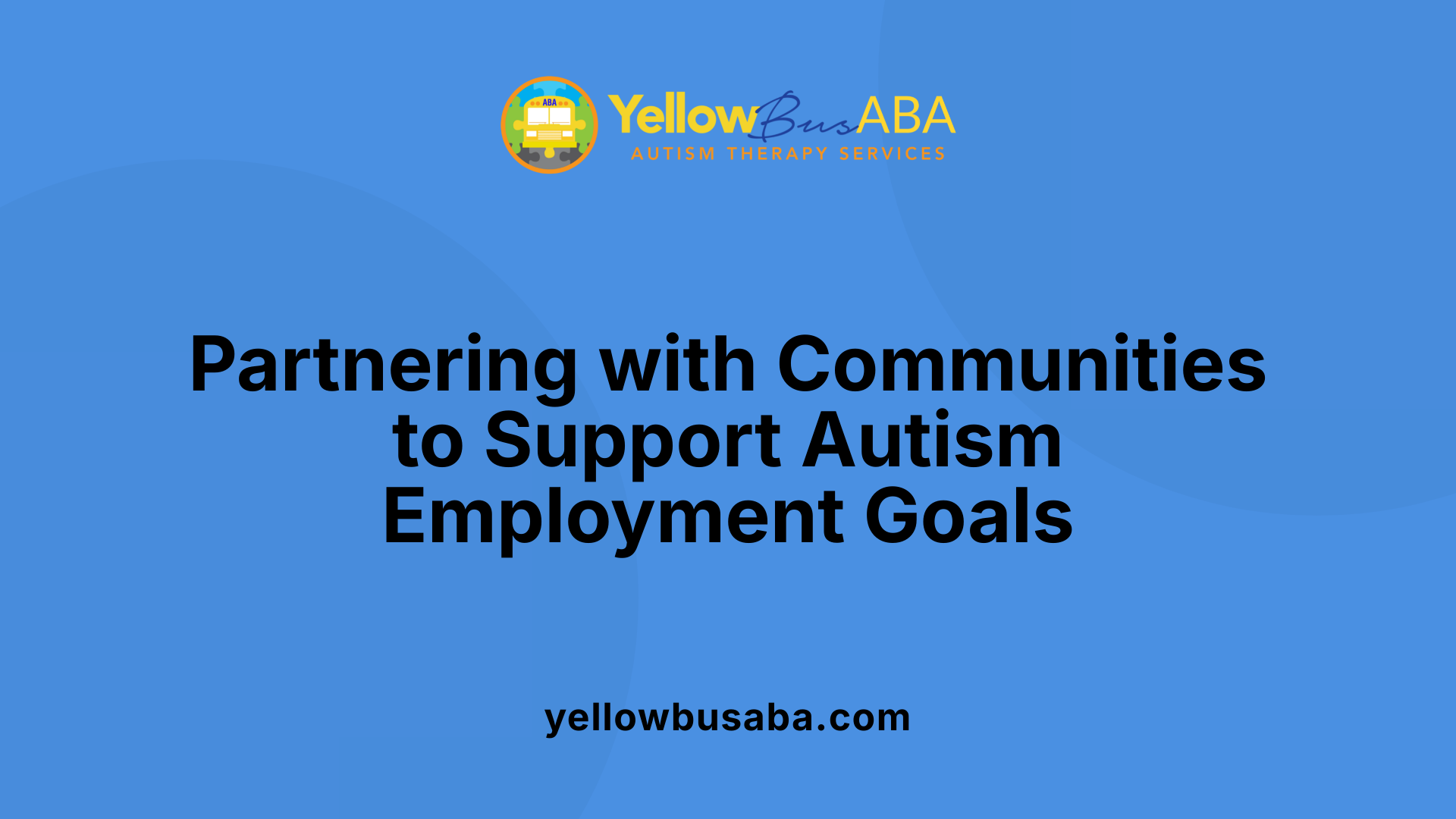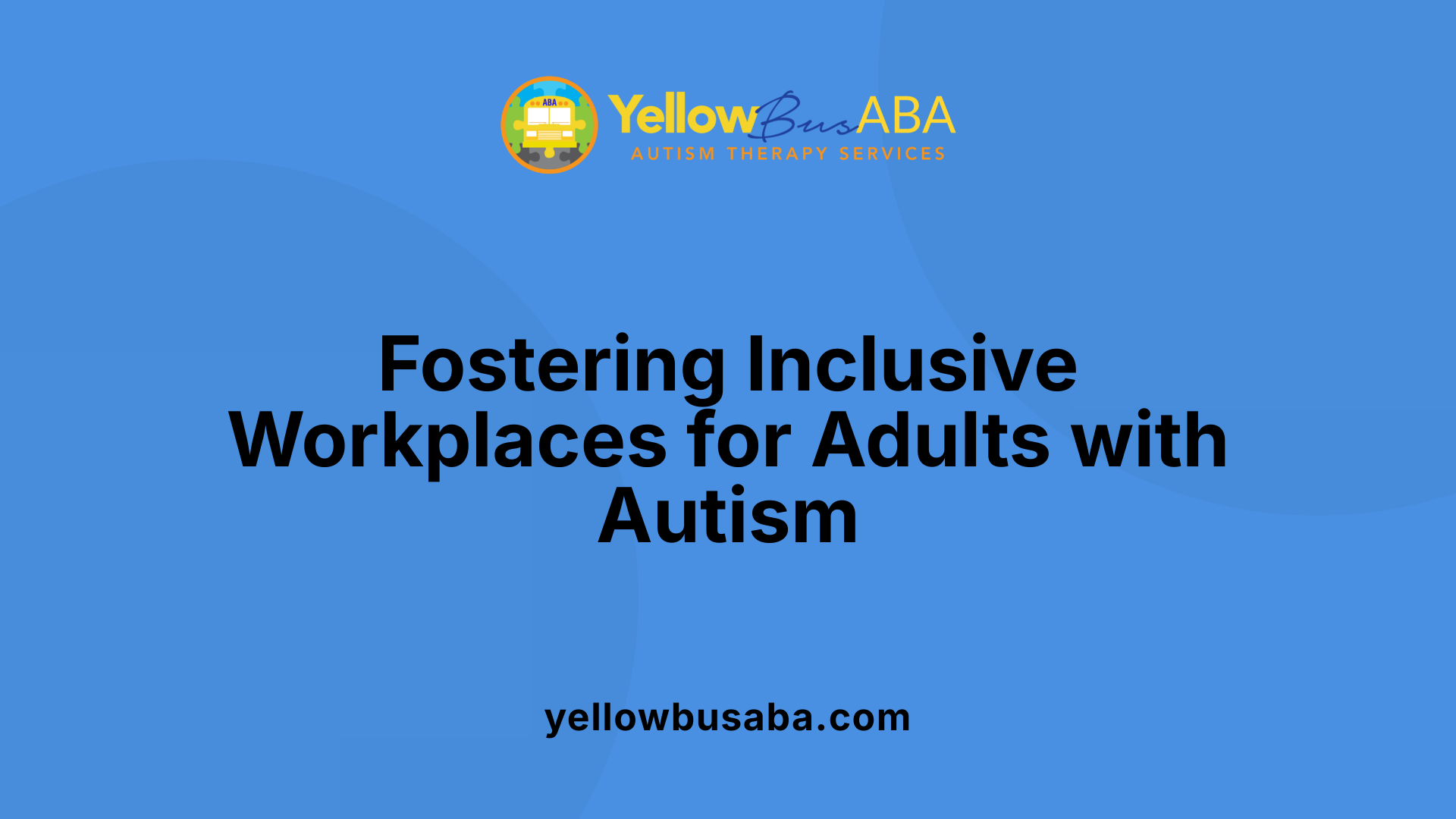Bridging Skills and Confidence Through ABA Therapy
Preparing young adults with autism for job interviews and employment transitions requires targeted, evidence-based strategies that build social, communication, and behavioral skills essential for workplace success. Applied Behavior Analysis (ABA) therapy has emerged as a key intervention, offering structured, personalized approaches to equip individuals with the tools needed to navigate the social landscape of employment with confidence and competence.
Developing Social and Communication Skills for Interviews

How does ABA therapy help young adults with autism improve their interview skills?
ABA therapy employs a variety of methods like role-playing, video modeling, and social narratives to prepare young adults with autism for job interviews. These strategies simulate real interview scenarios, allowing individuals to practice responses and social behaviors in a safe setting.
Skills such as making eye contact, active listening, and appropriate conversational responses are reinforced through prompting and positive reinforcement. Video modeling provides visual examples of successful interview behaviors, making it easier for individuals to imitate and learn.
ABA also focuses on teaching social norms and cues relevant to an interview context. Over time, these behaviors become more natural, enabling young adults to interpret social signals better and engage confidently.
To ensure these skills transfer from simulated settings to actual employment environments, ABA interventions include naturalistic teaching methods. These promote the generalization of learned behaviors, so individuals can apply new skills during real interviews with employers.
Furthermore, ABA incorporates communication training such as functional communication skills, helping individuals express themselves effectively during interviews. Building these expressive abilities boosts confidence and promotes successful social interactions.
Overall, ABA provides a structured, evidence-based approach that equips young adults with autism with the tools they need to approach job interviews with competence and self-assurance.
What behavioral and communication skills are targeted through ABA for better employment outcomes?
Key areas addressed by ABA include social interaction skills like understanding body language, facial expressions, and turn-taking in conversations. These are essential for engaging successfully during interviews and in workplace interactions.
ABA also emphasizes developing effective responses to interview questions, learning how to communicate qualifications, and demonstrating enthusiasm about the role. Techniques such as modeling behaviors, role-playing interview scenarios, and task analysis help in this skill development.
The therapy aims to teach individuals how to initiate social exchanges, maintain appropriate behaviors, and adapt their communication style to different social contexts. Reinforcement and prompting techniques ensure these skills are acquired and maintained.
Another focus is on the generalization and fluency of these skills, making them useful across various employment settings. Teaching responses for different types of questions and situations prepares young adults to handle diverse social demands confidently.
In summary, ABA enhances both social behavior and communication skills, directly impacting the ability of young adults with autism to succeed in the challenging social environment of the workplace.
How do ABA interventions promote the generalization of social and communication skills?
A significant aspect of ABA therapy is ensuring that learned skills are not only acquired but also effective across multiple settings. To achieve this, interventions use naturalistic teaching strategies that replicate real-world environments.
Role-playing in simulated interviews, combined with actual practice opportunities, helps individuals apply skills beyond the training context. Video modeling demonstrates desired behaviors that learners can imitate in various situations.
Reinforcement of successful interactions in different settings encourages generalization. ABA therapists often collaborate with families and employers to support ongoing skill practice in the community.
Additionally, visual supports, social stories, and virtual reality practice sessions reinforce learning in a controlled yet realistic way. This multi-faceted approach ensures that skills like maintaining eye contact or answering questions are transferred successfully to actual job interviews.
Long-term follow-up and booster sessions help maintain these skills over time, making it more likely they will be utilized effectively in real-world employment situations.
How is Willow Reach ABA supporting employment readiness for young adults with autism?
Willow Reach ABA offers comprehensive services, including in-home therapy, parent enrichment programs, and personalized training tailored to employment skills. Their focus is on preparing individuals for jobs and fostering independence.
A standout approach is their emphasis on social skills training for employment, such as practicing interview responses and workplace social norms.
They incorporate evidence-based methods like behavioral skills training (BST), which has been shown to improve interview responses, eye contact, and body language.
In addition, they support long-term community engagement by helping individuals generalize skills learned during training to diverse real-world settings.
By working closely with families and employers, Willow Reach ABA ensures that young adults are equipped with the practical skills necessary to succeed in various work environments, ultimately promoting sustained employment and independence.
Evidence-Based Approaches Demonstrating Effectiveness

How effective are evidence-based ABA methods in enhancing interview and social skills for young adults with autism?
Research consistently supports the effectiveness of ABA (Applied Behavior Analysis) in improving social and communication skills among young adults with autism. These methods have been shown to significantly boost behaviors like appropriate social interaction, effective communication, and emotional regulation, all of which are vital during job interviews and in the workplace.
Numerous studies, including randomized controlled trials and comprehensive reviews, confirm that ABA strategies lead to meaningful improvements. Techniques such as positive reinforcement, natural environment teaching, and behavioral skills training help individuals develop skills that transfer to real-world contexts. For example, skill gains in socialization, emotional understanding, and adaptive behaviors help young adults engage confidently in interviews and workplace interactions.
Early and sustained ABA intervention can foster long-lasting social competencies, making it easier for individuals with autism to access employment and community services. Evidence indicates that these approaches contribute to better employment outcomes, greater independence, and enhanced quality of life.
How does ABA therapy help young adults with autism prepare for job interviews and employment transitions?
ABA therapy plays a critical role in equipping young adults with autism for employment. It focuses on developing a broad set of workplace skills, including communication, social interaction, vocational competencies, and executive functioning.
Through personalized programs, ABA employs behavioral skills training (BST), modeling, and visual supports to teach participants how to perform well in interviews and adapt to workplace environments. For example, practice sessions may involve role-playing interview scenarios, where individuals learn to maintain eye contact, answer questions appropriately, and display positive body language.
ABA also targets organizational skills, time management, and problem-solving abilities, all of which are essential for smooth employment transitions. Additionally, collaboration with employers ensures that the work environment accommodates the needs of individuals with autism, fostering inclusivity.
Long-term ABA support includes ongoing skill reinforcement and environmental adaptations to promote retention and application of learned skills. This comprehensive approach enhances confidence and independence for young adults, making successful employment outcomes more achievable.
Virtual reality and multimedia tools in training
Innovative technology integration has expanded the reach and effectiveness of ABA interventions. Programs like JobTIPS utilize multimedia instructions, video modeling, visual supports, and virtual reality (VR) practice sessions delivered through web platforms and VR environments.
These tools cater to the learning preferences of individuals with autism, allowing safe and controlled practice of interview skills in simulated settings. The use of VR enhances engagement, provides immediate feedback, and helps generalize skills to real-world contexts.
Research demonstrates that combining web-based modules with VR environments results in significant improvements in verbal responses, content quality, and non-verbal behaviors like eye contact and body language. Importantly, these gains tend to maintain over time and generalize across different settings.
Long-term maintenance and generalization
A major focus of evidence-backed ABA programs is ensuring that skills learned during training are maintained long-term and generalized across environments. Studies have shown that skills acquired through interventions such as JobTIPS or PEERS® for Careers are not only retained but also applied effectively in real employment situations.
Community raters and independent assessors often report high social validity, indicating that the skills appear useful and natural in daily work contexts. Reinforcement strategies, booster sessions, and ongoing collaborative efforts with employers support sustained skill use.
| Aspect | Details | Impact |
|---|---|---|
| Methods Used | Behavioral skills training, VR sessions, multimedia tools | Improved verbal and non-verbal interview skills |
| Participants | High-functioning young adults (ages 16-19, predominantly male) | Outcomes include increased interview content and confidence |
| Results | Significant improvements post-intervention | Maintenance of skills over time with evidence of generalization |
| Significance | Supports broader employment success for individuals with ASD | Enhanced independence and community engagement |
Overall, the combination of research-driven ABA techniques, technological tools, and continuous follow-up interventions offers promising pathways for preparing young adults with autism for employment, leading to better social interactions, improved job retention, and greater personal independence.
Training Techniques That Build Interview Confidence

What role does ABA therapy play in preparing young adults with autism for employment and improving their interview performance?
ABA (Applied Behavior Analysis) therapy is instrumental in helping young adults with autism gain the skills necessary for success in the workplace. It focuses on developing essential abilities such as communication, social interaction, and executive functioning. For example, through personalized ABA programs, individuals learn how to express themselves clearly, understand social cues, and behave appropriately in various work settings.
Beyond skill acquisition, ABA therapy also tackles behavioral challenges and teaches coping strategies for anxiety, sensory sensitivities, and behavioral regulation. This holistic approach ensures that individuals are not only prepared with the necessary skills but are also confident and comfortable during interviews.
ABA programs often include targeted training for interview skills, combining techniques such as role-playing, simulated interviews, and reinforcement strategies. These methods help individuals practice both what to say and how to present themselves, including maintaining eye contact and using positive body language.
Supporting services from organizations like the Kelberman Center and the Autism Society of North Carolina offer additional vocational assessments and job coaching, further enhancing employment readiness. When combined with ABA therapy, these services provide a comprehensive framework that boosts confidence and equips young adults with autism to perform effectively in employment interviews.
Overall, ABA therapy's tailored, evidence-based interventions foster independence and self-advocacy, with the aim of improving job acquisition and retention outcomes for young adults on the autism spectrum.
Supporting Skill Generalization and Long-Term Success

How does ABA therapy help young adults with autism prepare for job interviews and employment transitions?
ABA (Applied Behavior Analysis) therapy is instrumental in equipping young adults with autism with the essential skills needed for successful employment. It focuses on teaching communication, social interaction, and vocational skills through customized interventions such as behavioral skills training (BST), modeling, visual supports, and reinforcement strategies.
One core aspect of ABA is ensuring that learned skills are not limited to therapy settings but can be applied across various work environments. This involves practicing skills in simulated conditions like mock interviews and then generalizing these abilities into real-world situations. Additionally, ABA addresses executive functioning challenges, including organization, time management, and problem-solving, all critical for a smooth employment transition.
The therapy emphasizes collaboration with employers and community resources to foster an inclusive workplace. This might involve autism awareness training and workplace adjustments to support individuals' success.
Long-term success hinges on continuous monitoring and ongoing coaching. Post-employment, ABA professionals and vocational support teams help maintain skills, adapt to new work demands, and troubleshoot challenges, fostering independence and job retention.
What role does ABA therapy play in preparing young adults with autism for employment and improving their interview performance?
ABA therapy is designed to target both the skills needed for employment and the behaviors that support workplace success. It teaches clear communication—both verbal and non-verbal—such as eye contact, body language, and appropriate responses during interviews.
In addition to improving interview skills directly through social skills training like PEERS® for Careers, ABA employs techniques such as video modeling and Virtual Reality-based practice sessions (like JobTIPS) to simulate interview scenarios. These tools help individuals rehearse responses, build confidence, and reduce anxiety.
Research shows that after targeted ABA interventions, young adults demonstrate measurable improvements in how effectively they respond to interview questions, including the accuracy and relevance of their answers. They also tend to show better non-verbal behaviors, such as maintaining eye contact and appropriate body language. Such improvements increase their chances of securing employment.
Programs like JobTIPS and PEERS® have demonstrated success, not only in enhancing immediate interview skills but also in promoting sustained application of social communication strategies. Participants report feeling better prepared and more confident, which positively impacts their employment outcomes.
Supporting Skill Generalization and Long-Term Success
Ensuring that employment-related skills are transferable across different settings is vital for lasting success. ABA programs systematically promote generalization by practicing skills in various contexts, including simulated work environments and real job sites.
Ongoing support and coaching are crucial to maintain and refine these skills. Continuous feedback, booster sessions, and community-based interventions help young adults adapt to new challenges and evolving workplace demands.
Employer collaboration forms a significant part of the support network. Educating employers about autism and providing workplace modifications foster an inclusive environment that respects individual strengths and needs.
Long-term monitoring involves regular follow-ups and assessments to track progress, address setbacks, and ensure skill maintenance. This sustained oversight promotes independence and enhances employment stability.
| Aspect | Description | Additional Details |
|---|---|---|
| Skill Transfer | Practice across various settings | Mock interviews, real job tasks, community outings |
| Ongoing Support | Continued coaching and training | Booster sessions, remote follow-ups |
| Employer Partnerships | Inclusive work environments | Accommodation training, awareness workshops |
| Long-Term Monitoring | Regular evaluations | Follow-up assessments, skill refreshers |
By integrating these components, ABA therapy supports young adults with autism in achieving meaningful employment, maintaining their roles, and thriving in their chosen careers.
Collaborative Efforts and Community Integration
 How does ABA therapy help young adults with autism prepare for job interviews and employment transitions?
How does ABA therapy help young adults with autism prepare for job interviews and employment transitions?
ABA therapy is instrumental in equipping young adults with autism with the skills needed for successful employment. It focuses on teaching communication, social interaction, and vocational skills that are vital in workplace settings. Using proven methods like behavioral skills training (BST), visual supports, video modeling, and reinforcement, ABA professionals tailor interventions to each individual. These strategies help learners practice and generalize skills across different environments, including mock interviews and real job situations.
Moreover, ABA therapy emphasizes developing executive functioning skills such as organization, time management, and problem-solving, which are crucial during job transitions. Behavioral interventions target behaviors that might pose challenges, ensuring individuals can navigate workplace social norms confidently. Additionally, collaboration with employers is vital; ABA providers often offer workplace training and autism awareness programs to foster understanding and inclusivity. Long-term planning and ongoing skill reinforcement assist young adults in maintaining employment, adapting to changing job requirements, and achieving independence.
What role does ABA therapy play in preparing young adults with autism for employment and improving their interview performance?
ABA therapy is central in transforming employment prospects for young adults with autism by fostering essential workplace skills. The therapy helps individuals improve their communication abilities, including expressive and receptive language, which are fundamental in interviews and ongoing employment interactions. It also addresses social skills, such as understanding social cues and appropriate body language, crucial for successful job interviews.
Through techniques like behavioral skills training and the use of multimedia tools like virtual reality and video modeling, ABA interventions simulate interview scenarios, allowing individuals to practice responses and build confidence. Additionally, ABA works on behavioral self-management strategies, helping individuals cope with anxiety and sensory sensitivities that may interfere with interview performance.
Complementary programs, such as Kelberman Center's employment services and the Autism Society of North Carolina's supported employment initiatives, expand on ABA efforts by providing vocational assessments, job training, and post-employment support. These combined efforts lead to greater employment readiness, improved interview outcomes, and increased chances of securing and retaining jobs.
| Aspect | Description | Additional Details |
|---|---|---|
| Skills Developed | Communication, social interaction, executive functioning, self-care | Enhanced through modeling, reinforcement, and behavioral interventions |
| Techniques Used | BST, video modeling, virtual reality, visual supports | Tailored to individual preferences and learning styles |
| Focus Areas | Job interview responses, workplace behavior, anxiety management | Incorporated into practice environments for skill generalization |
| Support Systems | Employer training, workplace accommodations, ongoing supervision | Foster inclusive and supportive work environments |
| Outcomes | Improved interview responses, increased employment, skill maintenance | Measured via assessments and community feedback |
The collective efforts of ABA therapy, community-based training models, and ongoing post-employment support create a comprehensive pathway for young adults with autism, facilitating their successful integration into the workforce. Parental and caregiver involvement remains vital in reinforcing learned skills and advocating for necessary workplace accommodations, ensuring lasting community engagement and independence.
The Importance of Parental and Community Support

How does ABA therapy help young adults with autism prepare for job interviews and employment transitions?
ABA (Applied Behavior Analysis) therapy is a vital tool in aiding young adults with autism to transition into the workforce. It focuses on teaching essential workplace skills such as communication, social interaction, vocational abilities, and executive functioning skills like organization, time management, and problem-solving.
Through customized strategies, ABA employs behavioral skills training (BST), modeling, visual supports, and reinforcement techniques. For instance, BST has proven effective in enhancing interview responses — improving verbal content and non-verbal cues like eye contact and body language. These skills are practiced in various settings, including mock interviews and real job environments, ensuring skills are widely applicable.
The therapy goes beyond skill acquisition by collaborating with employers to foster understanding and inclusivity. Employers may receive autism awareness training and workplace modifications based on individual needs.
To ensure long-term success, ABA involves ongoing monitoring and skill refinement. This continuous support helps young adults remain adaptable to changing work demands, ultimately fostering independence and increased job retention.
What role does ABA therapy play in preparing young adults with autism for employment and improving their interview performance?
ABA therapy is instrumental in preparing young adults with autism for employment by developing core skills such as effective communication, social understanding, and self-care routines — all crucial for workplace success. It supports individuals in gaining both expressive and receptive language abilities and understanding social cues within professional contexts.
One prominent method used within ABA is behavioral skills training (BST), which targets the improvement of interview responses. Research demonstrates that after BST-based interventions, participants show marked increases in appropriate verbal responses, questions asked, and positive body language.
Moreover, ABA addresses behavioral challenges and fosters independence, allowing individuals to approach job interviews with greater confidence and self-advocacy. Support organizations like Kelberman Center and the Autism Society of North Carolina complement ABA by providing vocational assessments, job training, and employment support tailored to each individual.
By integrating these services, ABA therapy substantially enhances employment readiness. This comprehensive approach not only improves interview performance but also prepares young adults with autism to succeed and thrive in various employment settings.
Conclusion: Toward Inclusive Employment

How does ABA therapy help young adults with autism develop essential workplace skills?
ABA therapy plays a vital role in equipping young adults with autism with the skills necessary for workplace success. It focuses on improving communication abilities, social interactions, executive functioning, and vocational skills. By engaging in targeted interventions, individuals learn to navigate the demands of working environments confidently.
What are the steps involved in the transition process for employment?
The transition process integrates several important components. These include conducting a functional assessment to identify current skills and areas for growth, setting personalized goals aligned with individual strengths and interests, and implementing training programs to teach essential workplace skills. Behavioral interventions are used to reinforce positive behaviors and facilitate skill acquisition. Additionally, skill generalization ensures that abilities gained are applicable across various settings, from mock interviews to actual job sites. Collaboration with employers and ongoing support further enhances employment outcomes throughout long-term engagement.
How does ABA therapy address emotional and sensory challenges in the workplace?
Young adults with autism often face anxiety, sensory sensitivities, and behavioral challenges that can impact their comfort and performance at work. ABA therapy incorporates teaching coping strategies designed specifically for these issues. Techniques include sensory integration methods, anxiety management strategies, and behavioral adjustments, which help individuals feel more confident and relaxed during work activities. This comprehensive approach promotes not only skill development but also emotional well-being and behavioral regulation.
How are skills taught to be applicable across different work environments?
Skills learned in ABA therapy are structured to be adaptable, enabling individuals to apply them in various settings, including simulated interviews and real jobs. Through activities like practice interviews, role-playing, and real-world experience, young adults learn to generalize their abilities. These methods ensure that they can respond appropriately to different employer expectations and work contexts, supporting sustained employment success.
What services does Willow Reach ABA offer to support employment readiness?
Willow Reach ABA provides a broad range of services aimed at preparing individuals with autism for independent employment. These include in-home ABA therapy, which allows for personalized skill building in familiar settings, parent enrichment programs to empower families, and customized training sessions targeting specific employment skills. Their approach emphasizes long-term independence and active community participation, aligning intervention goals with real-world employment opportunities.
How can behavioral skills training (BST) improve interview performance?
BST is an effective method used to improve interview skills among young adults with autism. It involves systematic teaching of both verbal responses and non-verbal behaviors such as eye contact and body language. In studies, participants showed notable improvements in how they responded during interviews, asking appropriate questions and exhibiting more appropriate body language. For some individuals, modifications such as prompts and reinforcement may be necessary to maximize benefit.
What evidence supports the use of Internet-based training programs like JobTIPS?
Research on the JobTIPS program demonstrates promising outcomes. This Internet-accessible training includes resources like Theory of Mind guidance, video modeling, visual supports, and virtual reality practice. A study involving 22 male adolescents with high-functioning autism showed that participants who completed the program responded more effectively during job interviews keying in on content quality and non-verbal cues. The skills learned were maintained over time and generalized to various settings, with positive feedback from community raters attesting to their social validity.
What features make these training programs practical and accessible?
Programs like JobTIPS leverage multimedia instructions, remote virtual reality tools, and online platforms, making them accessible and scalable. This combination allows individuals to practice interview skills anytime and anywhere, providing a realistic and engaging learning environment. Such technology-based approaches are especially valuable for promoting independence and preparing people for the diverse demands of employment.
What does the PEERS® for Careers program offer to young adults?
PEERS® for Careers is a 10-week social skills training designed specifically for autistic young adults. Conducted in bi-weekly 90-minute sessions, it focuses on employment-related skills such as acquiring, maintaining, and thriving in jobs or internships. Participants in the program reported significant improvements in their social skills knowledge and feelings of readiness for employment. They found the content and coaching helpful, which contributed to their confidence and employment pursuits.
How does preparation impact the success of job interviews for individuals with autism?
Practicing interview techniques significantly boosts confidence and performance. Strategies such as maintaining eye contact by focusing on a still object, being honest about one's knowledge, and researching the employer can have a positive influence. Presenting a portfolio of work or skills can also make a strong impression, especially in technical roles. Ultimately, thorough preparation helps individuals with autism to present themselves effectively and gain employment opportunities.
What are the overall benefits of targeted training for employment for young adults with autism?
Targeted interventions like ABA therapy, social skills training programs, and virtual reality practice tools collectively contribute to better employment outcomes for young adults with autism. These approaches help improve communication, social interaction, and confidence, enabling individuals to approach the workplace with skills and resilience. As employment rates for adults with autism remain low, these innovative strategies represent a step forward in fostering independence and meaningful community participation.
Fostering Independence and Confidence in the Workforce
The strategic integration of ABA therapy with community resources, employer partnerships, and family involvement creates a powerful blueprint for empowering young adults with autism. By systematically developing essential social, communication, and vocational skills, ABA prepares individuals to excel in job interviews and thrive in employment settings. As these young adults gain confidence and independence, they are not only better equipped to face workplace challenges but also contribute meaningfully to their communities. Continued innovation in ABA techniques, including virtual reality and multimedia supports, promises to further enhance employment readiness, ensuring that every young adult with autism has the opportunity to succeed in the workforce.
References
- The Role of ABA in Transitioning Young Adults with Autism
- Using Behavioral Skills Training to Teach Interview ...
- JobTIPS: A Transition to Employment Program for ...
- A pilot study of PEERS® for Careers: A comprehensive ...
- Preparing for a Job Interview with Autism
- The Role of ABA in Transitioning Young Adults with Autism
- ABA Therapy for Adolescents and Young Adults with Autism






